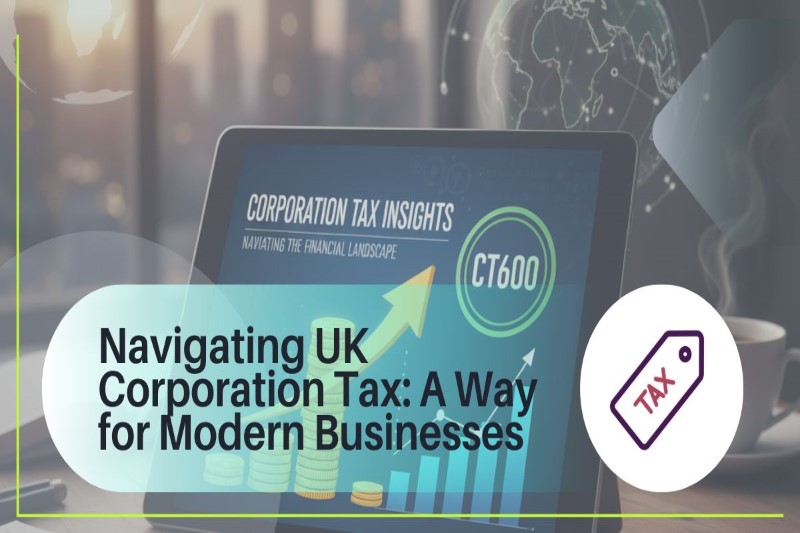Navigating UK Corporation Tax: A Way for Modern Businesses

November 13, 2025
For any limited company operating in the UK, understanding Corporation Tax is not just a legal obligation—it's a critical component of financial health. It's the tax paid on a company's taxable profits, which includes money earned from doing business, investments, and selling assets for a profit.
While seemingly straightforward, the process of calculating, reporting, and paying Corporation Tax can be complex. From navigating the main rate of 25% (for profits over £250,000) and the small profits rate of 19% (for profits under £50,000) to applying for various reliefs, the rules are constantly evolving. Staying compliant requires meticulous record-keeping and a deep understanding of ever-changing legislation.
The Challenges of Managing Corporation Tax In-House
For many businesses, particularly small and medium-sized enterprises (SMEs), managing Corporation Tax in-house can be a significant drain on time and resources. Common pitfalls include:
- Complex Calculations: Determining taxable profit involves more than just subtracting expenses from income. You need to identify allowable expenses, claim capital allowances like the Annual Investment Allowance (AIA), and apply reliefs for activities such as Research and Development (R&D).
- Strict Deadlines: Paying the tax and filing the Company Tax Return (CT600) have different deadlines. The tax must be paid nine months and one day after the end of the accounting period, while the CT600 is due 12 months after. Missing these deadlines can result in stiff penalties and interest charges.
- Risk of Errors: Without specialised expertise, businesses can easily miss valuable tax reliefs or make errors that lead to an incorrect tax calculation. This can not only result in overpayment of tax but can also trigger an HMRC investigation.
The Solution: Expert Corporation Tax Outsourcing
This is where a strategic approach to Corporation Tax Outsourcing becomes invaluable. By partnering with a dedicated service provider, you can transform a stressful compliance obligation into a streamlined, efficient process.
Outsourcing your Corporation Tax to experts like Doshi Outsourcing means a team of professionals takes on the burden of compliance for you. They handle the intricate calculations, prepare all the necessary documentation, and that ensure every submission is accurate and on time.
How Outsourcing Helps Your Business
- Cost-Effective Expertise: Instead of hiring a costly in-house tax specialist, you get access to a team of experienced professionals who are up-to-date on the latest UK tax laws and reliefs.
- Guaranteed Compliance: An outsourcing partner ensures your tax returns, including the crucial CT600, are filed correctly and on time, protecting you from penalties and audits.
- Focus on Growth: By entrusting the complexities of Corporation Tax to experts, you free up your internal teams to focus on core business activities, driving innovation and growth.
- Optimise Your Tax Position: Professionals are skilled at identifying every applicable relief and allowance, ensuring your business benefits from a fully optimised tax position, thereby reducing your overall tax liability.
In today's fast-paced business environment, you don't have to navigate the complexities of Corporation Tax alone. A smart Corporation Tax outsourcing strategy provides the expertise and support needed to ensure compliance, save money, and allow you to focus on building a successful future for your business.
Frequently Asked Questions (FAQ)
What is UK Corporation Tax?
Corporation Tax is the tax paid on a limited company's taxable profits in the UK. This includes money earned from standard business operations, investments, and selling assets for a profit.
What are the current main rates for Corporation Tax?
There are different rates depending on a company's profit level. The main rate is 25% for profits over £250,000 and a small profits rate of 19% applies for profits under £50,000
What rate applies if a company's profits are between £50,000 and £250,000?
For companies with taxable profits between the £50,000 small profits threshold and the £250,000 main rate threshold, a system called Marginal Relief applies.
- Marginal Relief provides a gradual transition, meaning the company pays a rate that is effectively higher than 19% on the profit falling within this band, but lower than the 25% main rate, ensuring a smooth increase in the tax paid.
- This mechanism prevents a sudden jump in tax liability once a company's profits exceed the small profits limit.
What are the deadlines for Corporation Tax?
There are two main deadlines:
- The tax must be paid nine months and one day after the end of the company's accounting period.
- The Company Tax Return (CT600) must be filed 12 months after the end of the accounting period.
How does outsourcing help with Corporation Tax?
Outsourcing transfers the burden of compliance to a team of experts. This helps your business by:
- Guaranteeing Compliance: Ensuring your returns, including the CT600, are filed correctly and on time.
- Optimising Your Tax Position: Professionals are skilled at identifying every applicable relief, like the Annual Investment Allowance (AIA) and R&D relief, to reduce your overall tax liability.
- Freeing Up Resources: Allowing your internal teams to focus on core business activities and growth.
Ready to streamline your corporation tax process and ensure compliance?
Contact Doshi Outsourcing today to learn how our expert team can help you. Schedule a free consultation to discuss your specific business needs and discover the benefits of our professional services.
📞 Call us on 0208 239 4999
📧 E-mail us at dhruv@doshioutsourcing.com
Please note: The content of this article is for informational purposes only. It should not be relied upon as legal, financial, or tax advice. For advice specific to your situation, please speak with a qualified professional, as regulations may have changed since publication.


